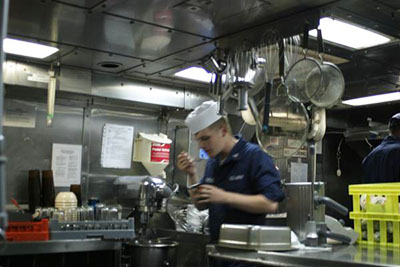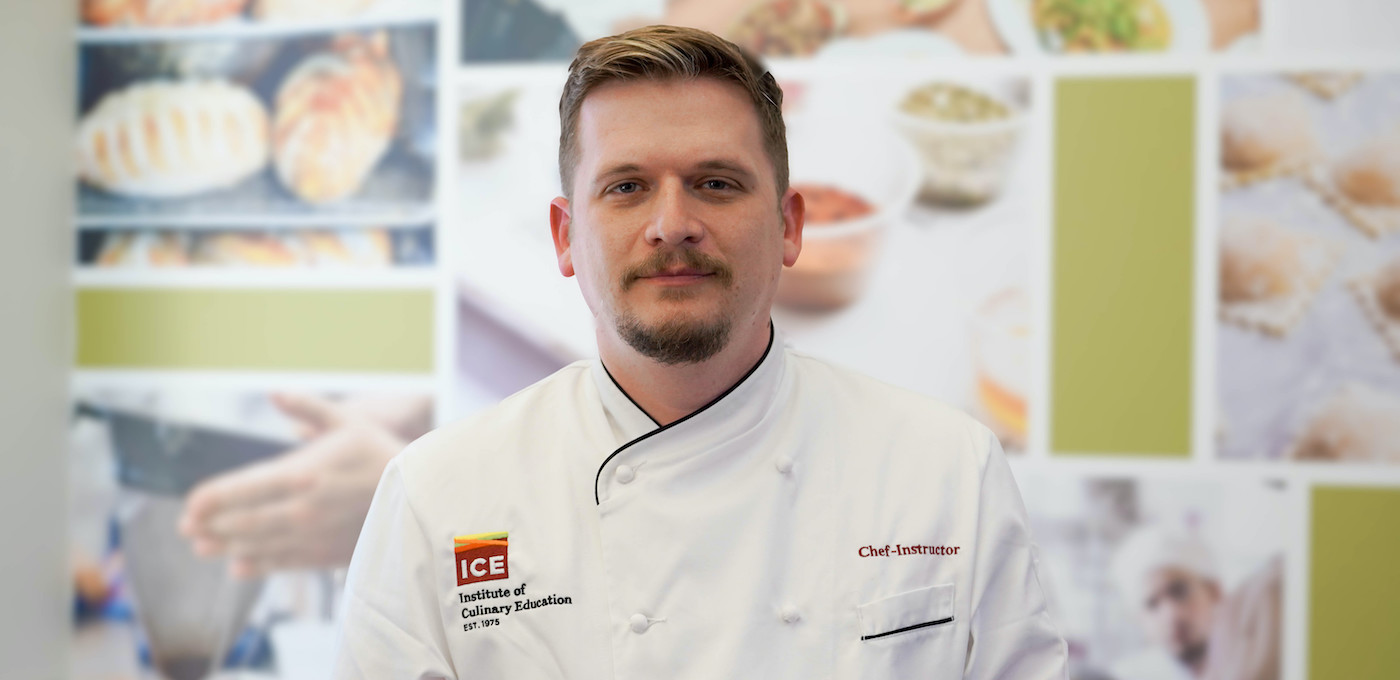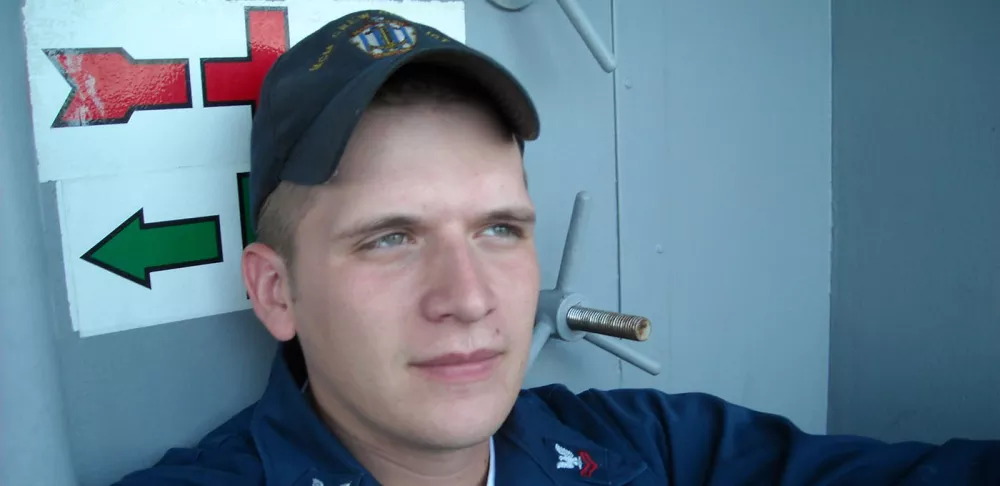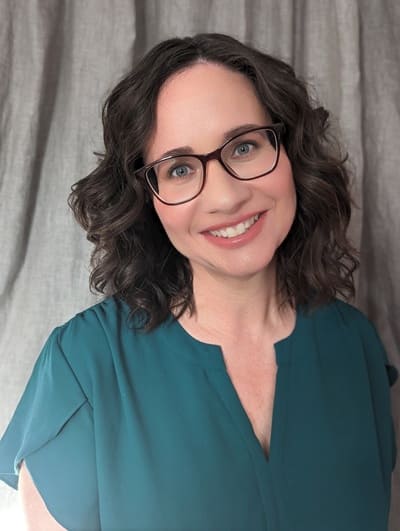After his Navy service, ICE Chef Shawn Matijevich now helms a different kind of crew — culinary students.
Many armed services veterans find careers as cooks and chefs after their military service.
In fact, one of the oldest culinary schools in the country was founded after World War II as a training program for former soldiers. Many veteran placement organizations use the culinary realm as a means of helping veterans reintegrate into civilian life. ICE proudly offers tuition discounts to our many veteran students.
For ICE’s Shawn Matijevich, Lead Chef of Online Culinary Arts and Food Operations, however, his kitchen life began before his military service — and was the very reason he enlisted.
“I really wanted to go to culinary school, but I couldn't afford it,” says Chef Shawn, who had already been working in restaurants in his home state of Virginia before his military service. “I knew that I could potentially pay for my culinary school with the GI® Bill*. So I joined the Navy.”
There's a natural connection between kitchen and military life. Anyone who’s ever worked in a restaurant kitchen — or even seen one in action — can observe how easily “yes, chef!” might translate to “yes, drill instructor!,” and vice versa. The word “brigade,” which is often used to describe a well-orchestrated kitchen team, primarily refers to subdivisions of an army.
Read More: Veterans Become Culinarians at ICE
The discipline instilled by service in the armed forces can indeed equip people for a life in the kitchen. Many veteran chefs have spoken of this phenomenon, including former White House Chef Andre Rush and food television’s Robert Irvine, among others.
To focus merely on this one element, however, would be missing much of the larger picture of the value of military service to kitchen life, which Chef Shawn’s story illustrates.
Restaurant Dining to Military Dining
Chef Shawn knew that his endgame going into the Navy was to work the kitchen. He wanted to use his military service both as a means of paying for culinary school, and for acquiring whatever training he could while enlisted.
In order to actually get into the kitchen, however, Chef Shawn had to make his case to his superiors. The barrier to entry wasn't because the position was highly coveted — in fact, it was quite the opposite.
“I had to convince them to let me be a cook, because that's all I really wanted,” he says. “They tried to convince me not to, because most people in the military don't think of that as the best job, but what I found out was it actually is one of the coolest jobs. The cooking isn't exactly fine dining, as you’re cooking for 1,000 people at a time. But you do learn quite a bit about leadership, business and logistics, which I think was really important for later on in my career.”
But you do learn quite a bit about leadership, business and logistics, which I think was really important for later on in my career.

Creative Problem Solving
Many skills from Chef Shawn's military service translated to his civilian life, especially in his various roles as a manager.
Two huge skills that inform his leadership style today are:
- Being able to effectively work with people of all different backgrounds and life experiences
- Creatively looking at problems to figure out solutions
“You can't quit the military once you start,” he says. “So you're stuck, and you have to deal with whatever comes up, and you have to make it work. You can’t just fire someone. So we're in the middle of the ocean, and if a conflict arises, we have no choice but to get the job done. That forces you to be very creative and work through problems, rather than just get rid of someone."
Chef Shawn has also taught many veterans in his time since becoming a chef-instructor, both at ICE and other culinary schools. He consistently sees the plethora of skills veterans bring to the kitchen.
“They have all this experience and this incredible skill set that can translate into civilian life," he says. "There's a whole list of other things that are so important that don't get taught in a fine dining kitchen: the leadership aspect and the ability to prepare and really come up with good logistical plans. Many veterans take for granted a lot of the skills that they have, that not everybody is always showing up on time in a really nice, clean uniform, with a great attitude. Employers really love veterans, because they're just ready to go.”
Many veterans take for granted a lot of the skills that they have, that not everybody is always showing up on time in a really nice, clean uniform, with a great attitude. Employers really love veterans, because they're just ready to go.
Read More: A Veteran Opens His Mind to Vegan Cooking and Baking
Introduction to World Cuisines
Various deployments took Chef Shawn to new places, including the Middle East and Southeast Asia, with opportunities to discover new cuisines, techniques and ingredients.
Additionally, he says that some of his favorite experiences were in ports where the U.S. government didn’t have contracts with major food service vendors. That meant they had to use intermediaries to source food locally, like the fresh chorizo in Cozumel that went toward making tacos or breakfast burritos for the crew.
“People really enjoyed that because it was something different,” says Chef Shawn.
Southeast Asia and Vietnam in particular sparked his interest so much that, following his military service, he moved to Vietnam for a period of time.
“After going to all those different countries, you can’t just stop,” he says. “I went back and tried to explore. The cooking methods are usually very simple, but the amount of ingredients that they have is just incredible. There were so many things that I couldn't even describe to people back home.”

The Power of Food
Despite his kitchen appointment, Chef Shawn found that his restaurant experience prior to the military was invaluable in his position. The additional training had a tremendous effect on his crew — and their stomachs.
He specifically remembers when he moved from cooking for 1,000 people to cooking for only 70 on a small ship during one of his deployments.
“In that scenario, I could actually use some of the skills that I had to feed people really good food, and they really appreciated that,” he says. “When the work is so hard, and difficult and potentially dangerous, those three meals that you can count on are usually your favorite time of day as long as the food is good. So I really realized the power of what food can do for people, when it could really affect the entire morale of the crew.”
I really realized the power of what food can do for people, when it could really affect the entire morale of the crew.
Though the venue may have changed from Navy ship in the middle of the ocean to his computer at home, Chef Shawn still uses many things he learned during his service daily.
This is especially crucial for him as educator when connecting with students.
"[In the Navy] I always tried to figure out what motivates someone and what makes them excited about what they’re doing," he says. "Usually the best thing is to look for positive aspects, and see what common ground you can find, and work from there.”
Work with Chef Shawn in ICE's Online Culinary Arts & Food Operations Program
*GI Bill® is a registered trademark of the U.S. Department of Veterans Affairs (VA). More information about education benefits offered by VA is available at the official U.S. government website at http://www.benefits.va.gov/gibill.






